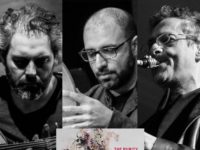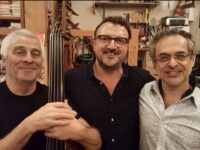Julian Costello is ever adventurous, and his style is familiar to his followers. However, be prepared to be surprised and delighted – not that Costello’s style lacks any finesse, but on the new album Vertigo, he takes things in a new direction. It’s a risky venture, you might think – but no, Costello, replete with a new band and some imaginative compositions, offers a different side to his music while still retaining his penchant for the smooth side of jazz.
With Vertigo, Costello combines contemporary jazz with world music and produces something that blends the two. He also adds touches of elements from swing, Latin, and popular music. The band features Sophie Alloway on drums, Stefano Tsourelis on guitar and oud, and Natalie Rozario on cello. Special guests include Iqbal Pathan on tabla and David Beebee on double bass. Costello plays soprano and tenor saxes.
Each musician brings something of their unique style to the recording, and some of the combinations are wonderful. After Alloway’s gentle opening ricochet on “Sorry But No,” for example, the cello rises and soars with the sax entering subliminally. Then there’s a pause, a re-group, and the gentle flow of the music begins again, now with tenor sax leading. Tsourelis offers a gorgeous and well-worked guitar solo which lifts the music to an even greater level.
The interaction between the cello and sax on “Inspector Morse” is pure joy, then “Stonehenge” is playful as Alloway’s intricate, light rhythm patterns entwine themselves around the tabla of Pathan. The cello on “The Whale” is pure indulgence and a wonderfully engaging listen in the solo sections and, where Rozario teams up with Tsourelis’s guitar, Costello’s sax, and the delicate, precision drumming of Alloway, the ensemble demonstrates their listening and interactive skills. The finale of this track is just wonderful.
Julian Costello shines on soprano sax on “To Be Fair,” while “Still Water” is a track of depth and layers of sound, topped by the oud and tabla which create an Eastern undertone to the number. “Why” is a melodic number with beautifully phrased tenor sax, a guitar-led interlude, and the cello providing a deep backdrop that brings tears to the eyes, it is so warmly emotive. The bass of Beebee under Costello’s tenor adds a jazz flair.
“Ooh I Like Your Shirt” is a cheeky number with opposing and contrasted rhythms pitched against open guitar and delicate percussive rhythms. “Look at Yourself With a Smile” is a fine example of how Costello uses each musician and gives them a perfect vehicle in which to deliver their sound. “42 Sydney Street” is a conglomeration of different sounds, subtleties, and expressions and is the standout track of the album. As the musicians interact, the track develops, with the deep drum adding menace and the changing rhythm patterns intrigue, while the cello swells and ebbs so the track feels like it is alive and breathing. Standout.
On “The King Cobra,” Julian Costello again brings each instrument in to create a sound that blends East and West, old and new in a subtly different way. The oud and table add mystery and an intriguing energy as they combine with the other instruments. The closing track is “Sorry But No Reprise” and features five overdubbed cello parts, which works brilliantly. When this is done with a single player, it can sometimes sound stylized, but this two-minute ending is simply beautiful and Rozario demonstrates her ability to produce sounds from her cello that are as rich and warm, also rhythmic, the instrument singing its varied voices in her hands.
Vertigo is a beautiful album; Julian Costello uses musicians of high caliber and adds his virtuoso lines on tenor and soprano saxophones. Costello style is in there, but he also allows for the development of new sounds, derived from the combination of the musicians he has chosen to surround himself with. An excellent listen.
- Milena Casado – ‘Reflection of Another Self’ (2025) - May 4, 2025
- Luis Ianes and Noel Akchote – ‘Seuil’ (2025) - April 12, 2025
- David Dower Trio – ‘Sonder’ (2025) - March 23, 2025




